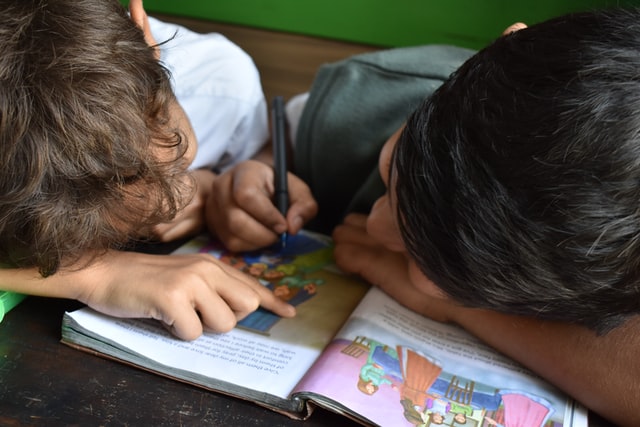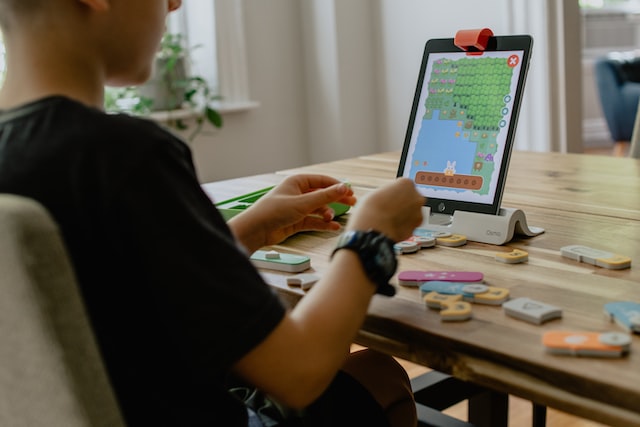It was a Thursday. I hadn’t slept well the night before and I just wanted to relax on the couch with a good book and some coffee. The kids were squirrely. We were all fighting distraction and lack of attention. As we started our school work that morning, I saw a difficult few hours ahead of us.
Then I had a flashback to teaching in my 5th-grade classroom with 35 students in front of me. What did I do on days when the kids were feeling restless?? I used classroom management strategies!
There were a few tips that I had adapted from other teachers that I used on difficult days. Sometimes we needed a re-set of expectations or behavior. Why have I not used these recently? Those tips would be so helpful for my homeschool day.
So I got the kids started on their independent work and sat with my cup of coffee to brainstorm. I wrote out a list of all the classroom tips that worked for me in the past. I realized how many tools I have for classroom management that can still apply to homeschooling. And so of course I had to share them here. Take what you need!
Classroom Management Ideas & Tips:
Ways to Manage Distraction:
- Set a timer for each assignment
- “you have 15 minutes to do this handwriting page”
- Timers can be an effective way to stay focused and create a short-term deadline.
- Reduce locations for schoolwork
- “you must sit here in this chair and do your work, no walking around”
- A benefit from homeschooling is the variety of locations where kids can do work. But with some personalities this can be distracting.
- Reduce clutter and stuff in that space
- remove extra materials, busy wall decor, toys, trash.. etc.
- I have trouble being productive in a messy work environment. Our first task to the school day is making space for work to be done. The hot-wheels cars, art projects, and snack bowls need to be cleared off the school table.
- Stop chatter and talking
- “we can talk about that at lunch time, focus on your schoolwork”
- My kids truly enjoy each other’s company. They can talk about Minecraft and tell silly jokes all morning if I do not keep them focused. It is a good thing, but focus and quiet work is important too.
- Give my youngest child one task at a time
- “do this page of math facts practice and then bring it to me”
- My younger kids get overwhelmed when I give them too many assignments at once. Some days they can handle a few things or a short list, other days I give them one page at a time and require a check-in with me to monitor their progress.
Parenting Tool: Use Visual Markers of Distraction
My example: I give each kid a jar of marbles (or candies) at the beginning of our schoolwork time. They start with 20-30. Each time they get distracted they lose one or two marbles. I simply look at the child and say “bring me 1 marble”. Then I reinforce what they should be doing as they return to their spot.

I like this concept more than adding up tally marks for misbehavior. I would rather encourage them to “keep the marbles in the jar”.
Before lunch, we count how many they kept in the jar and celebrate that with applause. Then we set a goal of next time keeping more in the jar. “Wow! You kept 10 marbles today. You were working at being focused. I bet that tomorrow you can keep 15 or more.” I do not give them treats, or any other prize. Just acknowledgement that they are making progress.
If they were not able to keep many marbles (less than usual) we talk about that. The conversation is like verbal journal prompts for the child to reflect on the day. There is no right or wrong answer. I do not rush them or shame them. They have to see what went wrong before they are willing to make a change.
- What happened today?
- What was different?
- What was your morning routine and how did that affect you?
- Did you eat breakfast?
- Were you talking to other people?
- What needs to change?
In our house, there are no outside consequences for the number of marbles in the jar. It stands alone as a measure for them to pay attention to. We all have good days and bad days. Kids are persons too. There are days when their self-control is not at its best or they are just feeling off. If I see specific patterns, then I can make some changes.
Every morning starts with a fresh jar of marbles. Each day is a re-set. This helps the child realize that you have wiped the slate clean and that you expect them to do their best every day.

Some days what is happening in our homeschool day is more than distraction or trouble with attention. Sometimes I have to get creative. Here is a list I use when a few tools above are not working.
Bad Attitude / Re-Focus Tips:
- Sit next to me to do work
- “because you are being distracted you have to sit next to me to help you focus”
- when the child is right next to me I can reach over and give gentle non-verbal cues to pay attention
- Take a bouncing break
- “go jump on the trampoline 20 times and then come back ready for schoolwork”
- “do 15 jumping jacks and then drink some water”
- Often active movement is needed to get the brain re-set.
- Reduce the activity in the room
- There might be noise, other kids, pets, and/or other distractions that are causing the child stress
- Think about what kind of work environment you need to be successful
- Is there music and talking that make the room feel overwhelming?
- Hugs & snuggles for a few minutes
- Sometimes the best cure for a bad attitude is comforting physical affection (hugs, back rubs, sitting on mom’s lap) I am always quick to be comforting to the kids and give out hugs for no reason.🙂
- Studies show that giving and receiving hugs from people we trust increases oxytocin and reduces cortisol. Hugging communicates that you are safe, loved and that you are not alone — a much-needed message for children and adults.
- Be clear on expectations
- Write things out so they can read what tasks need to be done
- Let a written list on a whiteboard or on paper be the task master
- “What does the list say?”
- “What should you be doing right now?”
- Add a variety of tasks to the school day
- reading / computer / handwriting / picture study
- Think about not only the subject your child is working on but the variety of learning they are experiencing.
- Listen to an audiobook for 15 minutes
- Sometimes distracted kids just need something to focus on to slow them down and get them in “school mode”. I have some favorite audiobooks on audible that we enjoy for this purpose.
- Here is great resource for book lists: https://readaloudrevival.com/all-booklists/
- Do a quick drawing lesson from YouTube
- this creates focus and is a short activity that uses multiple senses on a specific task
- Here is our favorite resource: https://www.youtube.com/@artforkidshub

One of the benefits of homeschooling is the flexibility we have. We can take breaks, give our kids a re-set, and teach them how to re-focus their attention. I learn and adjust as a teacher while they are growing knowledge as students. We get to learn together.
So, the next time a day is not going the way you had hoped, try one of these tips and see if it goes better. And if you have tips of your own please share them with me!
🙂 Happy Homeschooling! – April
Photo by Kelly Sikkema / Markus Spiske / Joshua Hoehne on Unsplash
